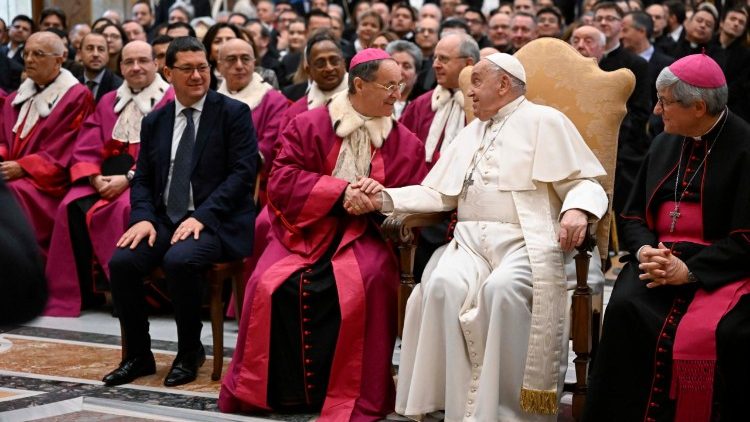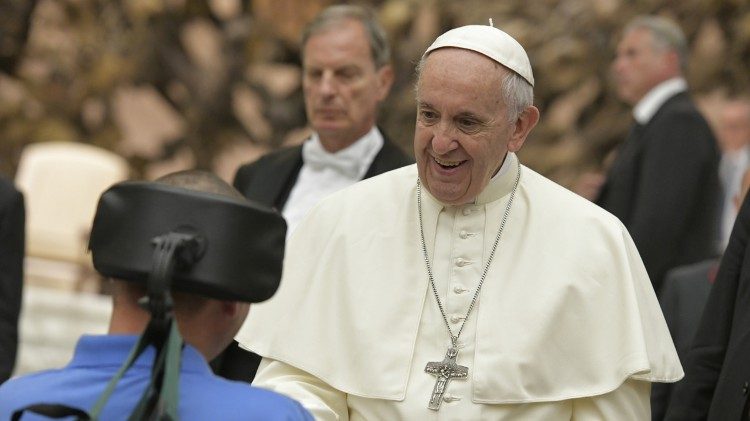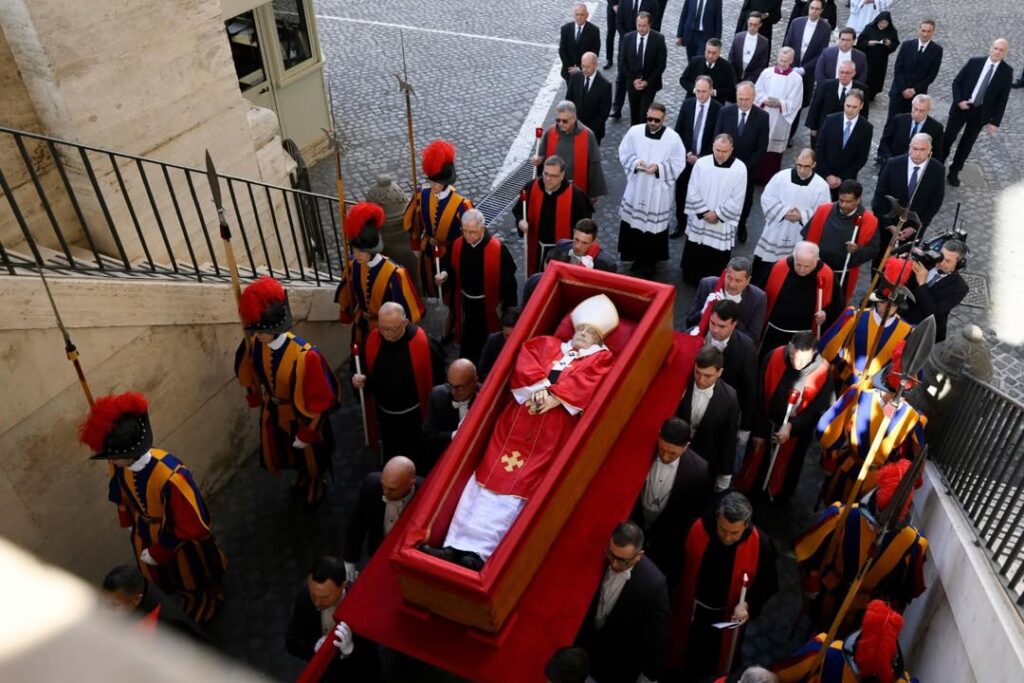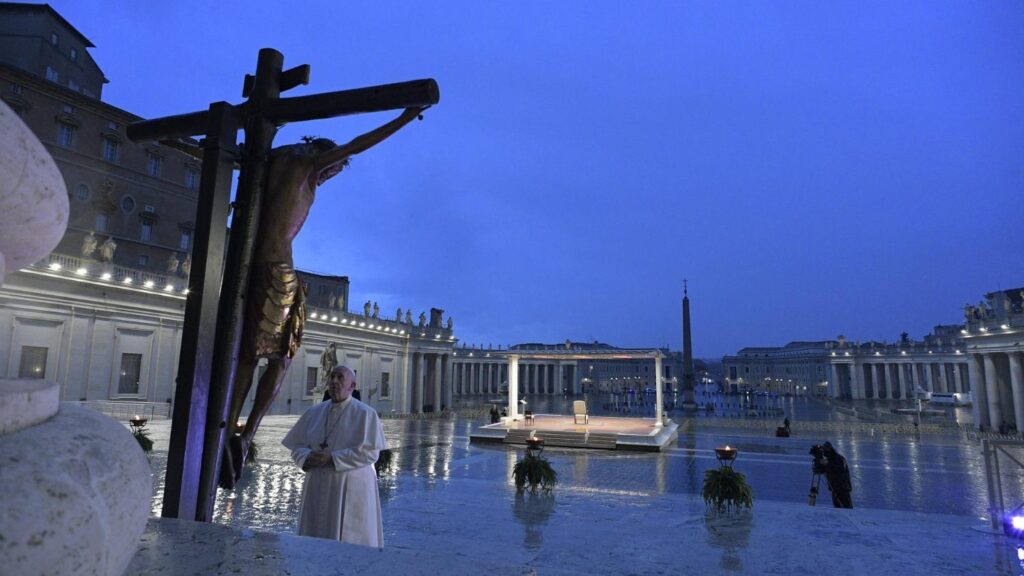“Those who have had an unhappy experience of marriage must be helped to navigate the path as quickly as possible”
In his speech at the opening of the 96th Judicial Year, the Holy Father highlights the importance of reforming the marriage annulment process and the centrality of the diocesan bishop

Pope Francis inaugurated the 96th Judicial Year of the Roman Rota Tribunal with a speech that underlined the importance of justice and mercy in marriage annulment processes. In the Clementine Hall of the Vatican, the Holy Father addressed the prelate auditors, renewing his appreciation and gratitude for their work and highlighting the tenth anniversary of the Motu Proprio “Mitis Iudex Dominus Iesus” and “Mitis et Misericors Iesus”, which reformed the marriage annulment process.
The reform, promoted by the Synod Fathers in 2014, sought to make the processes more accessible and agile, in line with the apostolic exhortation “Evangelii gaudium.” Pope Francis recalled that the pastoral conversion of ecclesiastical structures should include the administration of justice, in order to respond in the best possible way to those seeking to clarify their marital situation.
The diocesan bishop was placed at the center of the reform, being responsible for the administration of justice in his diocese. In cases of manifest nullity, the bishop must decide personally through the processus brevior, an expression of the request for the salus animarum. The Pope urged that the activity of the tribunals be incorporated into diocesan pastoral care, ensuring that the faithful are aware of the existence of the nullity process and guaranteeing that the procedures are free of charge.
The training of tribunal workers, both clergy and lay, is crucial to ensure that they act with justice and diligence. Investment in their scientific, human and spiritual formation benefits the faithful, who have the right to have their requests carefully considered.
Concern for the salvation of souls guided the reform and must continue to guide its implementation. Pope Francis highlighted the pain and hope of many faithful who seek clarity about their personal condition and the possibility of participating fully in sacramental life. The reform seeks to simplify and streamline processes, guaranteeing fundamental rights such as the right to defense and the presumption of validity of marriage.
The Holy Father recalled the words of St. Paul VI and Benedict XVI, stressing the importance of prudence and justice in the application of the norms. The family and marriage must be approached with veneration, recognizing the indissolubility of marriage as a gift from God.
Discernment on the validity of marriage is a service to the salus animarum, contributing to the culture of indissolubility in the Church and in the world. Pope Francis concluded his address by highlighting the great responsibility and beauty of the task of the prelate auditors, who help to purify and restore interpersonal relationships. He invoked the grace of a joyful conversion and the light to accompany the faithful to Christ, the gentle and merciful Judge, and blessed those present, asking for prayers for him.
This address reaffirms Pope Francis’ commitment to justice and mercy, and his desire that marriage annulment processes be a reflection of the Church’s concern for the salus animarum.
Full text:
INAUGURATION OF THE 96TH JUDICIAL YEAR OF THE TRIBUNAL OF THE ROMAN ROTA
ADDRESS OF HIS HOLINESS POPE FRANCIS
Clementine Hall
Friday, 31 January 2025
__________________________________________
Dear Prelate Auditors,
The inauguration of the Judicial Year of the Tribunal of the Roman Rota offers me the opportunity to reiterate my appreciate and my gratitude for your work. I warmly greet the Monsignor Dean and all those who provide your service in this Tribunal.
This year will be the tenth anniversary of the two Motu Proprio, Mitis Iudex Dominus Iesus and Mitis et Misericors Iesus, with which I reformed the process for the declaration of nullity of marriage. It seems timely to take this traditional opportunity to meet with you to recall the spirit that permeated this reform, which you applied with competence and diligence, and for the benefit of all the faithful.
The need to modify the norms regarding the procedure for annulment was made manifest by the synod Fathers gathered in the extraordinary Assembly of 2014, formulating the request to make trials more accessible and streamlined (cf. Relatio Synodi 2014, 48). The synod Fathers expressed in this way the urgency to complete the pastoral conversion of structures, already called for in the Apostolic Exhortation Evangelii gaudium (cf. no. 27).
It was all the more opportune that such conversion should also touch the administration of justice, so that it would respond in the best way possible to those who turn to the Church to shed light on their marital situation (cf. Address to the Tribunal of the Roman Rota, 23 January 2015).
I wanted the bishop, the diocesan bishop, to be at the centre of the reform. Indeed, he is responsible for administering justice in the diocese, both as a guarantor of the closeness of tribunals and supervision of them, and as judge who must decide personaliter in cases in which nullity appears manifest, or rather via the processus brevior as an expression of care for the salus animarum.
Therefore, I urged the inclusion of the activity of the tribunals in diocesan pastoral care, instructing the bishops to ensure that the faithful are aware of the existence of the procedure as a possible remedy to the situation of need in which they find themselves. It is sometimes saddening to learn that the faithful are unaware of the existence of this avenue. Furthermore, it is important “that processes remain free of charge, [so] that the Church manifest … the gratuitous love of Christ by which we have all been saved” (Mitis et Misericors Iesus, Proemio, VI).
In particular, the solicitude of the bishop is implemented in guaranteeing by law the constitution in his diocese of the tribunal, equipped with well-trained persons – clerics and laity – suited to this function; and ensuring that they carry out their work with justice and diligence. The investment in the training of such workers – scientific, human and spiritual training – is always to the benefit of the faithful, who are entitled to careful consideration of their petitions, even when they receive a negative response.
The reform was guided – and its application must be guided – by the concern for the salvation of souls (cf. Mitis Iudex, Proemio). We are called upon by the pain and hope of so many faithful who seek clarity regarding the possibility of full participation in the sacramental life. For many who have
“experienced an unhappy marriage, verification of the presence or lack of validity of the bond represents an important possibility; and these people must be helped along this road in the swiftest manner” (Address to participants in the course promoted by the Roman Rota, 12 March 2016).
The norms that establish the procedures must guarantee some fundamental rights and principles, primarily the right of defence and the presumption of validity of the marriage. The purpose of the process is not “to complicate the life of the faithful uselessly, nor far less to exacerbate their litigation, but rather to render a service to the truth” (Benedict XVI, Address to the Rota Romana, 28 January 2006).
I am reminded of what Saint Paul VI said, after completing the reform carried out by the Motu Proprio Causas matrimoniales. He observed that “in the simplifications […] introduced in the treatment of matrimonial cases, the intention is to make this exercise easier, and therefore more pastoral, without prejudice to the criteria of truth and justice, to which a trial must honestly adhere, in the confidence that the responsibility and wisdom of the Pastors are religiously and more directly committed” (Address to the Roman Rota, 30 January 1975).
Likewise, the recent reform was intended to favour “not the nullity of marriages, but the speed of processes – the speed – as well as the simplicity due them, lest the clouds of doubt overshadow the hearts of the faithful” (Mitis Iudex, Proemio). Indeed, to avoid that, as a result of overly complex procedures, the saying “summum ius summa iniuria” (Cicerone, De Officiis, I, 10, 33) become a reality, I abolished the need for a dual conforming judgment and encouraged more rapid decision-making in trials in which nullity is manifest, aiming at the good of the faithful and wishing to bring peace to their consciences. It is evident – but I would like to reiterate it here – that the reform strongly challenges your prudence in applying the norms. And this “requires two great virtues: prudence and justice, which must be informed by charity. There is an intimate connection between prudence and justice, because the exercise of the prudentia iuris is aimed at the knowledge of what is just in the specific case” (Address to the Roman Rota, 25 January 2024).
Every protagonist of the process approaches the conjugal and family reality with veneration, because the family is a living reflection of the communion of love that is God the Trinity (cf. Amoris laetitia, 11). Moreover, spouses united in marriage have received the gift of indissolubility, which is not a goal to be achieved by their own efforts, nor even a limitation to their freedom, but a promise from God, whose faithfulness makes that of human beings possible. Your work of discernment on the existence or otherwise of a valid marriage is a service, it is a service to the salus animarum, inasmuch as it allows the faithful to know or accept the truth of their own personal situation. Indeed, “every just judgment of the validity or nullity of marriage is a contribution to the culture of indissolubility both in the Church and in the world” (Saint John Paul II, Address to the Roman Rota, 29 January 2002).
Dear sisters, dear brothers, the Church entrusts a task of great responsibility to you, but first of all of great beauty: to help purify and restore interpersonal relationships. The Jubilee context in which we find ourselves fills your work with hope, the hope that does not disappoint (cf. Rom 5:5).
I invoke upon all of you, peregrinantes in spem, the grace of joyful conversion and the light to accompany the faithful towards Christ, who is the meek and merciful Judge. I bless you from my heart, and I ask you, please, to pray for me. Thank you!
_______________________________
Holy See Press Office Bulletin, 31 Januar 2025
Related

His Hope Does Not Die!
Mario J. Paredes
24 April, 2025
6 min

Francis. The Human and Religious Imprint of a Papacy
Isabel Orellana
24 April, 2025
5 min

A Pope’s Last Journey: Francis’ Body Transferred to St. Peter’s
Exaudi Staff
24 April, 2025
3 min

Cardinal Felipe Arizmendi: With the Risen Christ, There Is Hope
Felipe Arizmendi
24 April, 2025
6 min
 (EN)
(EN)
 (ES)
(ES)
 (IT)
(IT)

